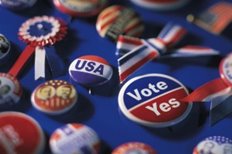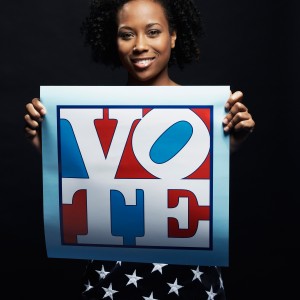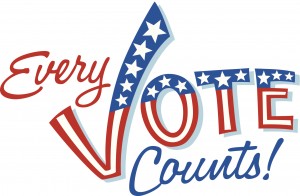Election tips for educators: Know your rights and the rules

Elections
Date Posted: 2/12/2020 | Author: Jennifer Mitchell, CAE
With the 2020 Texas primary election nearing, ATPE has been urging educators to be active and involved voters. We’ve shared resources on the ins and outs of voting, plus tools you can use to learn more about the candidates. Here on Teach the Vote, ATPE’s nonpartisan voter education website, we provide searchable profiles of every candidate vying for a seat in the Texas Legislature or State Board of Education this year, aimed at helping you learn their views about public education.  We’ve also asked you to remind your co-workers, friends, and family members about the importance of voting in every election, helping them to become informed voters, too.
We’ve also asked you to remind your co-workers, friends, and family members about the importance of voting in every election, helping them to become informed voters, too.
The 2018 elections saw a surge in voter turnout within the Texas education community, which paid off the following year: The Legislature in 2019 approved billions of dollars of additional funding for our public schools and higher pay for many teachers through House Bill 3. While new laws passed in 2019 are still being implemented, there is already anxiety about the state’s ability to maintain funding for House Bill 3 into the future, along with other pressing issues such as school safety, healthcare affordability, and student testing. Strong educator turnout in the 2020 elections will be even more critical if we want to keep public education at the forefront of the next legislative session.
Unfortunately, at the same time we’re doing our best to get educators fired up about voting, there are some who would prefer that active and retired teachers stay home on election day. One of their attempts to dampen educator turnout has been through intimidation, issuing dire warnings about election laws and the criminal consequences for educators who may cross the line. How do we keep educators enthusiastic about voting and encouraging others to vote while still helping them understand what they can and cannot do under the law?

Election laws can be complicated, and in this rapidly evolving area of the law, new regulations may be subject to varying interpretations, at least until they become time-tested and vetted by court cases that may take decades to resolve. Collisions can easily occur at the intersection of the First Amendment and the various state laws, administrative rules, advisory opinions, and official policies on political activity. There will always be plenty of “grey area” for legal scholars to debate, but in the meantime, there is at least one simple rule of thumb that can help public school employees figure out what’s allowed and what’s not. If you are showing support for a specific candidate, political party, or measure that appears on the ballot (such as a local proposition for a new bond or a constitutional amendment), then you should take care to avoid using any resources of your school district while doing so.
Get Out The Vote (GOTV) initiatives have long been accepted as nonpartisan activities that do not cross the line into what’s considered “political advertising” or “electioneering.” Encouraging people to vote, regardless of how they might vote, benefits no particular candidate or political party. High voter turnout is simply good for our democracy.
The rules get trickier when it comes to partisan activities, such as asking people to vote for a specific candidate or to support one political party over another. There’s a big difference between urging someone to “go vote,” and urging them to “go vote for _________.”
As educators, you have a constitutional right to undertake partisan activities. You are well within your rights to share with other people your personal preferences in any given election and even to try to persuade them to vote the same way. You can give money to a candidate or PAC, walk the neighborhood handing out campaign materials, or wear the candidate’s t-shirt to show off your support. But when it comes to partisan election activities and communications, it’s important for public employees to restrict those to their own personal time and assets. It is unlawful for public school employees to use school district resources for electioneering or political advertising. That means, for instance, that you should not print out flyers for your favorite candidate on the printer in the teachers’ lounge, and you should not use your school email address to send out invitations to the candidate’s fundraiser. In other words, if taxpayers are footing the bill for it, consider it off-limits when it comes to your own personal preference toward someone or something that will appear on a ballot.
For more guidance on what is and is not allowable for public school employees, school district leaders, and school board trustees to do during election season, check out these additional resources made for educators:
- “Election Do’s and Don’ts” created by ATPE and other members of the Texas Educators Vote Coalition
- “Campaign Speech During Elections” and “Can Schools Still Promote a Culture of Voting?” from the Texas Association of School Boards
- “A Short Guide to the Prohibition Against Using School District Resources For Political Advertising in Connection with an Election,” created by the Texas Ethics Commission
- Your school district’s local policies

Educators can and should be active participants in the electoral process, and you have an excellent opportunity to model good citizenship and political involvement for your students. Make sure you know your rights and the rules, and then get out and vote!
Early voting for the 2020 Texas primary election runs February 18-28. Primary election day is March 3, 2020.
CONVERSATION
RECOMMENDED FOR YOU

Elections, Miscellaneous, TEA | Commissioner | SBOE, Testing | Accountability, Texas Legislature
06/21/2024
Teach the Vote’s Week in Review: June 21, 2024
STAAR scores continue to generate buzz. Plus, watch this video on upcoming House of Delegates consideration of the ATPE Legislative Program.

02/24/2026
Get out and early vote this week for important statewide offices
It’s time to Teach the Vote in the races for Texas governor, lieutenant governor, attorney general, and comptroller.

02/20/2026
Teach the Vote’s Week in Review: Feb. 20, 2026
Early voting is underway through Friday, Feb. 27. Plus: Check out the brand-new ATPE Mobile App.

